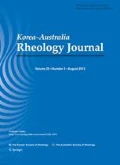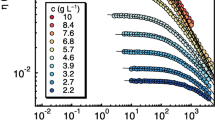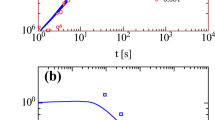Abstract
The extensional rheology of polymer melts and dilute polymer solutions has been extensively examined through experiments and theoretical predictions. However, a systematic study of the extensional rheology of polymer solutions in the semidilute regime, in terms of examining the effects of concentration and molecular weight, has not been carried out so far. Previous experimental studies of the shear rheology of semidilute polymer solutions have demonstrated that their behaviour is distinctively different from that observed in the dilute and concentrated regimes. This difference in behaviour is anticipated to be even more pronounced in extensional flows, which play a critical role in a number of industrial contexts such as fiber spinning and ink-jet printing. In this work, the extensional rheology of linear, double-stranded DNA molecules, spanning an order of magnitude of molecular weights (25-289 kilobasepairs) and concentrations (0.03-0.3 mg/ml), has been investigated. DNA solutions are now used routinely as model polymeric systems due to their near-perfect monodispersity. Measurements have been carried out with a filament stretching rheometer since it is the most reliable method for obtaining an estimate of the elongational stress growth of a polymer solution. Transient and steady-state uniaxial extensional viscosities of DNA dissolved in a solvent under excess salt conditions, with a high concentration of sucrose in order to achieve a sufficiently high solvent viscosity, have been determined in the semidilute regime at room temperature. The dependence of the steady state uniaxial extensional viscosity on molecular weight, concentration and extension rate is measured with a view to determining if data collapse can be observed with an appropriate choice of variables. Steady state shear viscosity measurements suggest that sucrose-DNA interactions might play a role in determining the observed rheological behaviour of semidilute DNA solutions with sucrose as a component in the solvent.
Similar content being viewed by others
References
Anna, S.L., G.H. McKinley, D.A. Nguyen, T. Sridhar, S.J. Muller, J. Huang, and D.F. James. 2001. An interlaboratory comparison of measurements from filament-stretching rheometers using common test fluids, J. Rheol.45, 83–114.
Bach, A., H.K. Rasmussen, and O. Hassager. 2003. Extensional viscosity for polymer melts measured in the filament stretching rheometer, J. Rheol.47, 429–441.
Bhattacharjee, P.K., D.A. Nguyen, G.H. McKinley, and T. Sridhar. 2003. Extensional stress growth and stress relaxation in entangled polymer solutions, J. Rheol.47, 269–290.
Brockman, C., S.J. Kim, and C.M. Schroeder. 2011. Direct observation of single flexible polymers using single stranded DNA, Soft Matter 7. 8005–8012.
Christanti, Y. and L.M. Walker. 2001. Surface tension driven jet break up of strain-hardening polymer solutions, J. Non-Newton. Fluid Mech.100, 9–26.
Clasen, C. 2010. Capillary breakup extensional rheometry of semi-dilute polymer solutions, Korea-Aust. Rheol. J.22, 331–338.
Dinic, J., L.N. Jimenez, and V. Sharma. 2017. Pinch-off dynamics and dripping-onto-substrate (DoS) rheometry of complex fluids, Lab Chi.17, 460–473.
Dinic, J., M. Biagioli, and V. Sharma. 2017. Pinch-off dynamics and extensional relaxation times of intrinsically semi-dilute polymer solutions characterized by dripping-onto-substrate rheometry, J. Polym. Sci. Pt. B-Polym. Phys.55. 1692–1704.
Dinic, J. and V. Sharma. 2019. Macromolecular relaxation, strain, and extensibility determine elastocapillary thinning and extensional viscosity of polymer solutions, Proc. Natl. Acad. Sci. U.S.A.116. 8766–8774.
Goudoulas, T.B., S. Pan, and N. Germann. 2018. Double-stranded and single-stranded well-entangled DNA solutions under LAOS: A comprehensive study, Polyme. 140, 240–254.
Gupta, R.K., D.A. Nguyen, and T. Sridhar. 2000. Extensional viscosity of dilute polystyrene solutions: Effect of concentration and molecular weight, Phys. Fluids12. 1296–1318.
Heo, Y. and R.G. Larson. 2005. The scaling of zero-shear viscosities of semidilute polymer solutions with concentration, J. Rheol.49. 1117–1128.
Hsiao, K.-W., C. Sasmal, J. Ravi Prakash, and C.M. Schroeder. 2017. Direct observation of DNA dynamics in semidilute solutions in extensional flow, J. Rheol.61, 151–167.
Huang, C.C., R.G. Winkler, G. Sutmann, and G. Gompper. 2010. Semidilute polymer solutions at equilibrium and under shear flow, Macromolecules43. 1010–10116.
Hur, J.S. E.S.G. Shaqfeh, H.P. Babcock, D.E. Smith, and S. Chu. 2001. Dynamics of dilute and semidilute DNA solutions in the start-up of shear flow, J. Rheol.45, 421–450.
Laib, S., R.M. Robertson, and D.E. Smith. 2006. Preparation and characterization of a set of linear DNA molecules for polymer physics and rheology studies, Macromolecules39. 4115–4119.
Larson, R.G. and P.S. Desai. 2015. Modeling the rheology of polymer melts and solutions, Annu. Rev. Fluid Mech.47, 47–65.
McKinley, G.H. and O. Hassager. 1999. The Considere condition and rapid stretching of linear and branched polymer melts, J. Rheol.43. 1195. 1212.
McKinley, G.H. and T. Sridhar. 2002. Filament-stretching rheometry of complex fluids, Annu. Rev. Fluid Mech.34, 375–415.
Nguyen, D.A., P.K. Bhattacharjee, and T. Sridhar. 2015. Response of an entangled polymer solution to uniaxial and planar deformation, J. Rheol.59, 821–833.
Pan, S., D. Ahirwal, D.A. Nguyen, T. Sridhar, P. Sunthar, and J.R. Prakash. 2014. viscosity radius of polymers in dilute solutions: Universal behaviour from DNA rheology and Brownian dynamics simulations, Macromolecules47. 7548–7560.
Pan, S., D.A. Nguyen, B. Dünweg, P. Sunthar, T. Sridhar, and J. Ravi Prakash. 2018. Shear thinning in dilute and semidilute solutions of polystyrene and DNA, J. Rheol.62, 845–867.
Pan, S., D.A. Nguyen, T. Sridhar, P. Sunthar, and J. Ravi Prakash. 2014. Universal solvent quality crossover of the zero shear rate viscosity of semidilute DNA solutions, J. Rheol.58, 339–368.
Pecora, R. 1991. DNA: A model compound for solution studies of macromolecules, Scienc. 251, 893–898.
Prakash, J.R. 2019. Universal dynamics of dilute and semidilute solutions of flexible linear polymers, Curr. Opin. Colloid Interface Sci.43, 63–79.
Regan, K., S. Ricketts, and R.M. Robertson-Anderson. 2016. DNA as a model for probing polymer entanglements: Circular polymers and non-classical dynamics, Polymer. 8, 336.
Rubinstein, M. and R.H. Colby. 2003. Polymer Physics, Oxford University Press, New York.
Sambrook, J. and D.W. Russell. 2001. Molecular Cloning: A Laboratory Manual, 3rd Ed., Cold Spring Harbor Laboratory Press, New York.
Sasmal, C., K.-W. Hsiao, C.M. Schroeder, and J. Ravi Prakash. 2017. Parameter-free prediction of DNA dynamics in planar extensional flow of semidilute solutions, J. Rheol.61, 169–186.
Schroeder, C.M. 2018. Single polymer dynamics for molecular rheology, J. Rheol.62, 371–403.
Shaqfeh, E.S.G. 2005. The dynamics of single-molecule DNA in flow, J. Non-Newton. Fluid Mech.130, 1–28.
Sridhar, T., M. Acharya, D.A. Nguyen, and P.K. Bhattacharjee. 2013. On the extensional rheology of polymer melts and concentrated solutions, Macromolecule. 47, 379–386.
Sridhar, T., V. Tirtaatmadja, D.A. Nguyen, and R.K. Gupta. 1991. Measurement of extensional viscosity of polymer solutions, J. Non-Newton. Fluid Mech.40, 271–280.
Stoltz, C., J.J. de Pablo, and M.D. Graham. 2006. Concentration dependence of shear and extensional rheology of polymer solutions: Brownian dynamics simulations, J. Rheol.50, 137–167.
Sunthar, P., D.A. Nguyen, R. Dubbelboer, J.R. Prakash, and T. Sridhar. 2005. Measurement and prediction of the elongational stress growth in a dilute solution of DNA molecules, Macromolecules38. 1020–10209.
Tajmir-Riahi, H.A., M. Naoui, and S. Diamantoglou. 1994. DNAcarbohydrate interaction. The effects of mono- and disaccharides on the solution structure of calf-thymus DNA, J. Biomol. Struct. Dyn.12, 217–234.
Tirtaatmadja, V. and T. Sridhar. 1993. A filament stretching device for measurement of extensional viscosity, J. Rheol.37. 1081–1102.
Wang, Y., S. Cheng, and S.-Q. Wang. 2011. Basic characteristics of uniaxial extension rheology: Comparing monodisperse and bidisperse polymer melts, J. Rheol.55. 1247–1270.
Wang, Y. and S.-Q. Wang. 2011. Salient features in uniaxial extension of polymer melts and solutions: Progressive loss of entanglements, yielding, non-Gaussian stretching, and rupture, Macromolecules44. 5427–5435.
Acknowledgments
This work was supported by the ARC Discovery Projects grant arrangement (Project No. DP120101322). Douglas Smith at UCSD and Brad Olsen at MIT are thanked for their generous gifts of the originally synthesized 25 kbp Fosmid and 289 kbp BAC DNA constructs as agar stab cultures of E. coli. Authors would like to acknowledge Michael Danquah (previously at Monash University), for facilitating lab space as well as DNA isolation amenities. IIT-B Monash research Academy at IIT Bombay, India is thanked for funding and overall provisions. We also thank the anonymous referee for helpful suggestions that have improved the quality of the paper.
Author information
Authors and Affiliations
Corresponding author
Additional information
Publisher's Note
Springer Nature remains neutral with regard to jurisdictional claims in published maps and institutional affiliations.
This paper is based on an invited lecture presented by the corresponding author at the 30th Anniversary Symposium of the Korean Society of Rheology (The 18th International Symposium on Applied Rheology (ISAR)), held on May 21-24, 2019, Seoul.
Rights and permissions
About this article
Cite this article
Pan, S., Nguyen, D.A., Sunthar, P. et al. Uniaxial extensional viscosity of semidilute DNA solutions. Korea-Aust. Rheol. J. 31, 255–266 (2019). https://doi.org/10.1007/s13367-019-0026-1
Received:
Revised:
Accepted:
Published:
Issue Date:
DOI: https://doi.org/10.1007/s13367-019-0026-1




